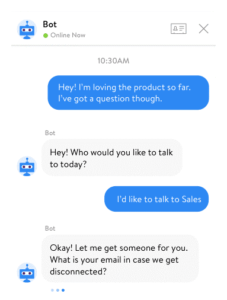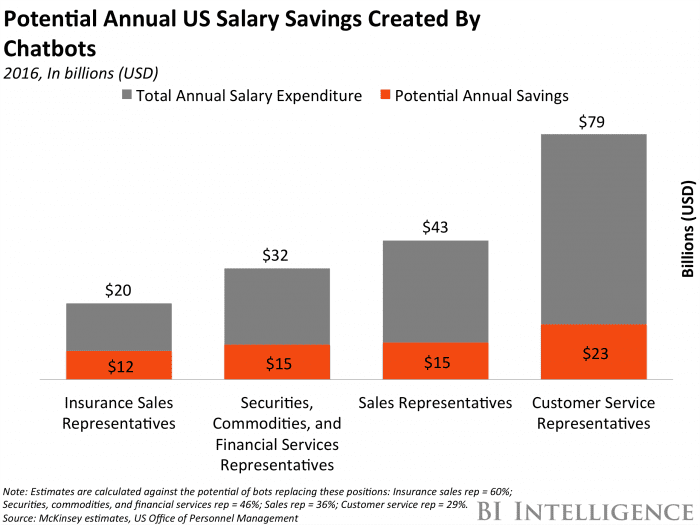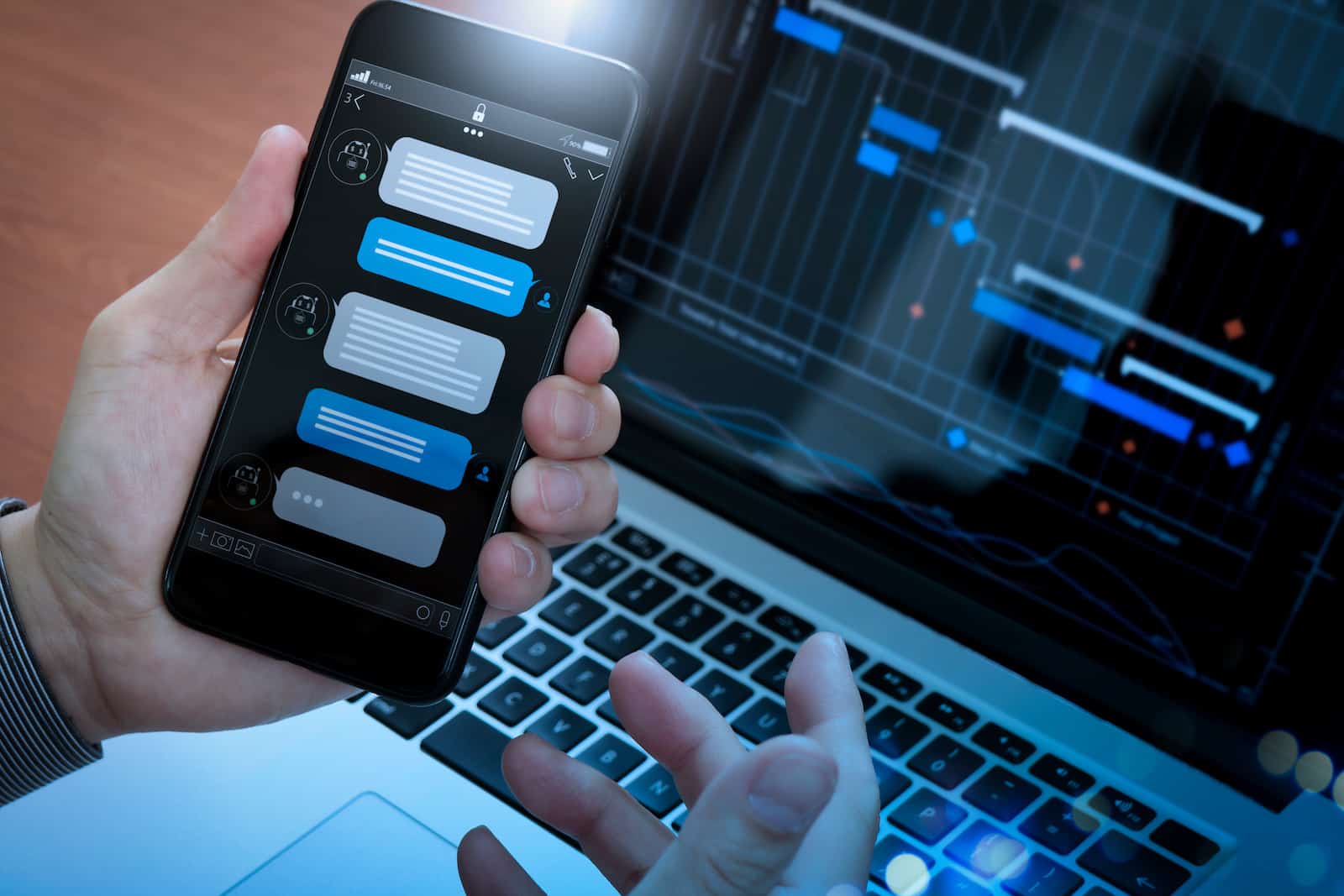Ask any B2B marketer and they’ll tell you that AI or artificial intelligence is revolutionizing the world of digital marketing. And chatbots are one such application of AI that has been making headlines as its use can be seen in various sectors, including b2b marketing.
Chatbots are transforming the way businesses interact with their new and existing clients, and when brands employ high-quality chatbots, the changes are generally positive.
Moreover, a study by oracle indicated that 80% of organizations plan on using chatbots by 2020. Another Ubisent study showed that 35% of clients expect more companies to use chatbots. This is quite an interesting discovery considering how new this practice is.
Chatbots are a type of software that can interact with humans via the live chat interface, which can take place on a business website, an app, or through platforms like Facebook, Skype, Messenger, Whatsapp, Slack, and even Alexa.
“Chatbots are artificial intelligence systems that interact with users via messaging, text, or speech”
By 2024, the global market size for chatbots is expected to reach 9.4 billion USD at a CAGR of 29.7%. Leading brands like National Geography and Starbucks are already leveraging chatbots to improve sales and gather information.
Simple chatbots monitor the consumer’s questions for keywords to send pre-packaged answers and on the other hand, sophisticated AI(artificial intelligence) and ML(Machine Learning) powered chatbots use natural language processing for creating more-complex responses and conversations. AI-base chatbots provide satisfactory answers, which leads to higher conversions and sales.
AI-programmed chatbots are more flexible especially when a consumer interacting with them doesn’t offer the relevant information they’re designed to receive. This is because they learn from the interactions they have to ensure that the clients achieve their goals.
These ai-powered chatbots work more efficiently when integrated with CRM and CMS platforms that support an organization’s online presence, enabling them to obtain valuable customer information and offer personalized experiences.
How Will The Emergence Of Chatbots Impact B2B Marketing?
As the number of sophisticated chatbots emerges, it comes as no surprise that its impact on digital marketing will be massive. In fact, it’s quite safe to assume that chatbots will completely revolutionize the world of b2b marketing.
With that being said, here are 5 ways chatbots will influence b2b marketing:
Better Lead Qualification
The road to making prospects interact with a brand’s website and converting them into loyal customers isn’t a short one. However, by deploying chatbots at every stage of the customer’s journey can help in streamlining the process for both B2B as well as B2C settings. This is because chatbots can ask website visitors relevant questions and assist them in finding products/services that pertain directly to their preferences.
Furthermore, chatbots can analyze the patterns of the visitor to determine if they’re a qualified lead and as such, save the sales team valuable time. also, chatbots allow for a much quicker sales process at every stage, but more particularly in the critical initial stages. This, in turn, reduces stress for your sales representatives and helps in providing a seamless customer experience.
Data Mining
Data gathering is just as important as lead qualifications. It isn’t just the customers that need to explore sources, analyze huge information for making informed decisions. Sales representatives also need to examine data to determine the exact wants and needs of their consumers or to find better-qualified leads.
When it comes to large scale b2b marketing, it isn’t humanly possible to extract all the relevant information, organize it, and examine it to enhance services, tailor special approaches, and deliver products to the desired audience. However, thanks to chatbots, b2b marketers can automate the data management process, enabling them to map the data on the basis of changing organizational trends.
Facebook Scraps A.I. Chatbots After They Created Their Own Language

Chatbots help marketers in tracking consumer behavior and purchasing patterns by scanning user data. This helps b2b companies to determine which products to promote differently, which to advertise more, and which one to refine for a relaunch.
Simply said, companies can keep track of the responses and commands the chatbot receives from their users, predict the responses on the basis of consumer language and make the bot to recommend more relevant services or products to consumers in addition to informing marketing and sales representatives for personalized services.
Better Customer Service
Chatbots help businesses improve their customer response rate round the clock. This means chatbots can offer accurate, personalized, and quick responses to common queries 24/7. Consumers value this immensely, especially when looking for reliability and obtaining information about products or services.
Additionally, chatbots allow representatives to work on more complicated customer service problems as it handles most of the basic and repetitive queries without requiring any interference.
Chatbots can also engage with customers the same way a customer support representative would, and as such, customers can easily engage with a chatbot. Furthermore, since most chatbots implement natural language processing approaches, they can examine the client’s queries and offer a relevant response.

Additionally, most chatbots can be added to the company’s site or mobile apps, thereby saving the consumers the time and also the trouble of navigating through the website for resources to find the desired answers.
Cost Savings
Firstly, implementing a chatbot is much quicker and cheaper in comparison to developing a cross-platform application or employing staff for each task. Organizations have several options from pre-developed software by Microsoft, Facebook, and other major brands to choose from.
Also, being an automated solution, chatbots allow businesses to simultaneously manage several clients at a time. As such, by employing sophisticated chatbots, you’ll be able to minimize employee cost and also avoid issues generated by human errors.
Chatbots also make sales reps more productive by aiding them to find better-qualified leads, which leads to a significant reduction of direct sales and sales training costs. A study by Business Insider reveals that chatbots can help organizations save 15 billion USD in sales representatives.

Optimized Strategies
Another great advantage of chatbots is the ability to optimize marketing campaigns. As consumers engage with them, chatbots collect information that can be used for tailoring suggestions that have a high chance of turning to a sale. Instead of making the customers fill out a survey, chatbots communicate with the client naturally and gathers information based on their responses. And the best part of this is the more they engage, the more data they gather and improve.
Also, chatbots can guide the sales funnel in addition to guiding purchasing options with tailored recommendations that lead to conversions.
The Final Say
In conclusion, B2B companies are slowly acknowledging the advantages of chatbots for marketing, sales, and customer service. Thanks to the many benefits chatbots offer, several B2B organizations have already started using chatbots.
chatbot design -DepositPhotos


